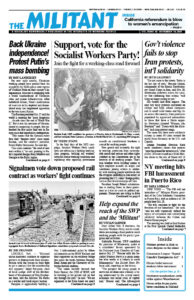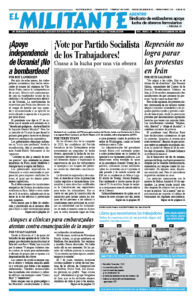After being fired on Oct. 5, a pregnant UPS worker committed suicide in the company’s huge Worldport facility in Louisville, Kentucky, the world’s largest automated package sorting facility.
Twenty thousand workers, many of whom are members of Teamsters Local 89, unload, sort and reload packages on UPS planes at the 70 docks at the 5 million square foot warehouse. They work on 155 miles of conveyor belts where the company’s production goal is to move 115 packages every second.
After news of her death broke, workers at Worldport spoke to the Guardian, without giving their names for fear of company retaliation. “She was pregnant and got fired because she fell asleep on the job,” one worker said, adding that when the distraught worker said she had to collect herself and went to the bathroom, the supervisor who fired her never checked back to make sure she was OK.
Workers described facing threats of termination for being late or for going to the restroom too often, all while working under constant surveillance. Others described the intense speedup and work intensity, often working with worn out, unsafe equipment and being pushed to do more with fewer workers.
Kaitlin Estill, who worked recently at the UPS Worldport facility in Cincinnati, told the Militant that one of the biggest challenges for the union was the company’s efforts to exacerbate tensions between the drivers and loaders, the better to divide and exploit them. The computer system often directed loaders to overload trucks, she said. As a seasonal loader, she got one 10-minute break on an eight-hour shift.
UPS profits grew nearly tenfold in 2021 over the year before. The company says its revenue should top $100 billion this year. UPS told the Guardian “the health and safety of our employees is our first priority.”
Several reports in the press paint a different picture. “‘Culture of Fear’ Grips UPS; Workers Say Injuries Underreported,” was the headline of a Bloomberg Law article in late 2019. It describes how a worker in New Hampshire fell from a loading dock and broke his hip, pelvis, wrist and elbow. Managers put him on a cart and rolled him to the parking lot before calling for an ambulance. The Occupational Safety and Health Administration fined UPS a paltry $13,260, and then dropped the fine entirely when the company agreed to review its procedures.
To increase profits UPS does not air-condition facilities like Worldport, or most of its trucks where cargo areas can go above 120 degrees on hot days. Between 2015 and 2019 at least 107 UPS workers in 23 states were hospitalized for heat prostration. These kinds of working conditions are familiar to millions of workers.
Thousands of union members over the past year have taken up the fight for work schedules that allow for time for a family life and to participate in union and other activity in defense of the working class; for pay increases to keep up with inflation so they don’t find themselves one or two paychecks away from being homeless; and for safer working conditions.
The contract for the 400,000 Teamsters at UPS expires next July 31. Among the union’s demands are an end to excessive overtime, two-tier wages, subcontracting and company harassment.

